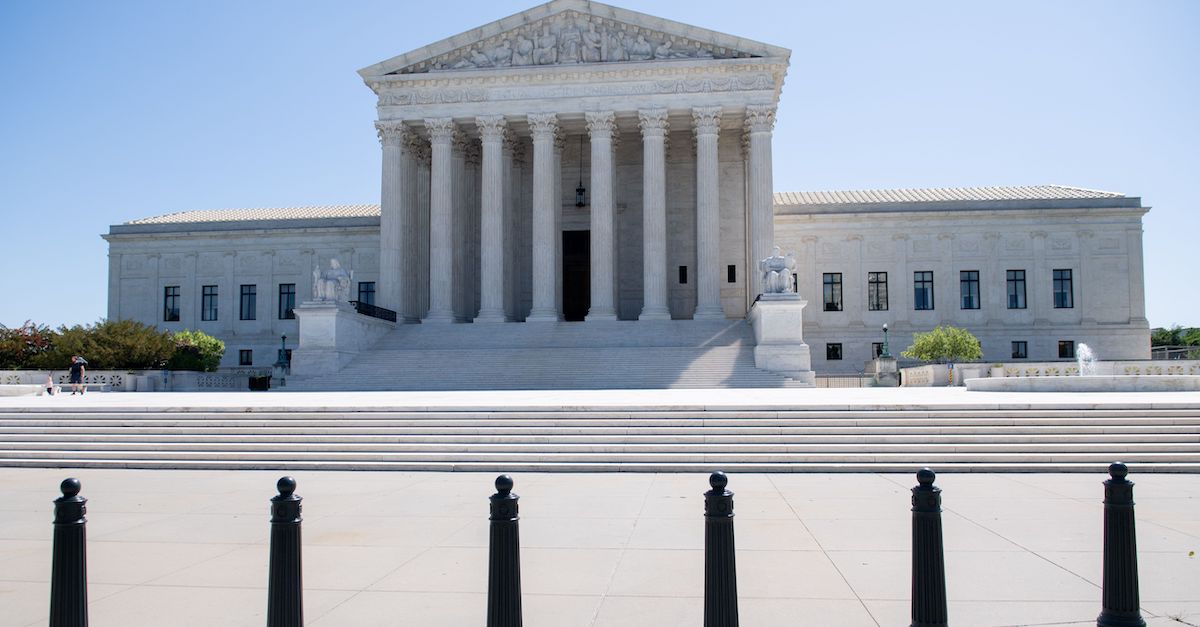
The Supreme Court of the United States handed down an opinion in the “Faithless Elector” cases on Monday, which will maintain status quo on all things electoral college for the foreseeable future. Holding that the Electors’ “constitutional claim has neither text nor history on its side,” the Court ruled unanimously that states have the right to effectively force members of the electoral college to vote for the popular-vote winner.
Unlike the many conservative/liberal court splits we’ve seen lately, SCOTUS unanimously sided against the electors with just Justice Clarence Thomas writing a separate concurrence to lay out some alternative reasoning. The often-fractured Court agreed, however, on the outcome: if a state wishes to prohibit faithless electing, it can absolutely do so.
The consolidated cases Chiafalo v. Washington and Colorado Department of State v. Baca asked whether individual members of the electoral college (the “electors”) have the right to cast votes for someone other than their pledged candidate who won the most votes in their respective states. The cases stemmed from the 2016 presidential election. In Ohio, three electors cast ballots for Ohio Gov. John Kasich (R), despite Hillary Clinton’s (D) having won the popular vote; in Washington, a trio of “Hamilton electors” cast votes for Colin Powell instead of Clinton.
The Court’s official opinion was filed in the Chiafalo case, but it bound both cases by a brief order in the corresponding Baca case.
Like Washington and Ohio, individual states have their own mechanisms to ensure that whoever is appointed as an elector votes for the popular winner. Generally speaking, the way it works is that a state will require an elector to “pledge” in advance that they will support the party nominee. Then, the winning party appoints its electors, and the electors are expected to vote for the party nominee. Any elector who fails to vote in accordance with their pledge faces consequences such as civil fines and dismissal as an official elector.
The plaintiffs in the two cases argued that the consequences they faced as a result of exercising their votes as chosen were unconstitutional deprivations of their right to vote. SCOTUS disagreed. Justice Elena Kagan wrote for the Court. In her opinion, Kagan relied heavily on an analysis of the wording of Article II, pointing out that although “everyone still calls them ‘electors’, they vote without discretion.” Justice Kagan embarked on a lengthy history lesson, explaining that the electoral college had been the result of “an eleventh-hour compromise.”
Kagan explained 32 states have enacted statutes “to prohibit so-called faithless voting.”
“Rather than just assume that party-picked electors would vote for their party’s winning nominee, those States insist that they do so,” Kagan noted. Those prohibitions written into state law, Kagan wrote, are perfectly legal. She called the Constitution “barebones” on the issue of electors.
Rejecting the argument that the word “vote” implies a freedom to choose, Kagan wrote that the word merely connotes a casting of a ballot. “Although voting and discretion are usually combined,” wrote the justice, “voting is still voting when discretion departs.”
Justice Thomas penned his own concurrence (which was joined in part by Justice Neil Gorsuch), agreeing that electors do not have the right to go rogue – but rejecting the majority’s reliance on the interpretation of Article II. That particular portion of the Constitution, argued Thomas, only addresses the appointment of electors, but says nothing about the way those electors are expected to vote. Thomas chastised his colleagues for overreaching, arguing:
The Court’s attempt to ground such a power in Article II’s text falls short. Rather than contort the language of both Article II and the state statute, I would acknowledge that the Constitution simply says nothing about the States’ power in this regard.
It is precisely in that silence, the justice wrote, where the inherent power of the states to legislate lies.
As we have discussed before, SCOTUS was undoubtedly aware that the issue of faithless electing would, if not managed, recur in future presidential elections. Settling the matter now, outside of the context of the 2020 presidential election, settles the question of states’ rights to remove or sanction electors who step out of line.
EqualCitizens.US founder and attorney for the electors in the Chiafalo case attorney Lawrence Lessig reacted to the ruling against his clients.
“When we launched these cases, we did it because regardless of the outcome, it was critical to resolve this question before it created a constitutional crisis. We have achieved that. Obviously, we don’t believe the Court has interpreted the constitution correctly,” Lessig said in a statement obtained by Law&Crime. “But we are happy that we have achieved our primary objective — this uncertainty has been removed. That is progress.”
Jason Harrow, EqualCitizens.US Chief Counsel who argued the Baca case, agreed that SCOTUS was right to settle the matter before the upcoming election, but warned: “[M]ake no mistake: laws binding electors are not a cure-all, they can go haywire in unexpected situations, and presidential electors remain free to choose in eighteen states.”
[Image via Saul Loeb/AFP via Getty Images]
Have a tip we should know? [email protected]